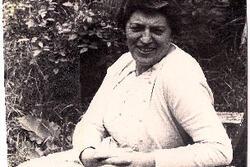A Recipe That Defies Time—Just Like Passover Itself
There are exactly five ingredients in my grandmother’s brisket recipe: a brisket cut, onions, carrots, ketchup, and golden ginger ale.
This might not sound particularly appealing—I found the list odd the first time I heard it, and no one I’ve told it to has had the reaction you’d want for a good recipe. Rather than a “Wow, that sounds pretty good!” I usually hear a “Really?? Nothing else? Are you sure?”
Despite the simple and seemingly questionable list of ingredients, this brisket recipe is the best one out there—I promise. And when you think about how a brisket cooks, the ingredients make perfect sense. As the meat cooks ever-so-slowly over a period of several hours, the ketchup and ginger ale help caramelize the onions, and the carrots add a bit of extra flavor at the end.
I never ate brisket prepared by my grandmother and namesake (Sylvia Grossman z”l)—she died before I was born. My mother, however, made it a few times when I was growing up, particularly for Jewish holidays. Although my mom was not a big cook, there were a few recipes that she found special, and this was one of them, mainly because it made her feel closer to her own mom. While she had many Jewish cookbooks that had been passed down over the ages, this recipe was written on a small sheet of notepaper, in my grandmother’s own handwriting. Over time, the handwriting has become smudged, and the paper has gotten a little ragged. My mom keeps it framed alongside pictures of me and my sister, as well as a silk scarf with my grandmother’s initials, creating, in her words, “an archive of memories I treasure most!”
I think it’s fitting that our family makes this recipe most often at Passover, because out of all the holidays on the Jewish calendar, Passover lends itself best to ritualized memory. Every year, we re-tell the story of Passover in a way that defies temporal boundaries. Throughout the seder, we speak in the first-person plural, explaining that we ourselves were taken out of Egypt, we ourselves were freed. We eat matzoh for eight days, not only to to honor our Jewish ancestors who escaped slavery, but also as a show of solidarity, to say that we experience what they experienced. For the duration of the seder, the limits of time are lifted, and there is no separation between us and the Jewish people who came before us.
For me, food offers a similar escape from temporality, and I know I’m not alone. When you taste food that’s tied to a certain memory, it can transport you back in time, even just for a moment. What’s more, food becomes ritual in itself: matzoh is as tied to Passover as the four cups of wine, just like challah is as tied to Shabbat as the lighting of candles.
Brisket works in a similar way for me, and I think for my mother. It’s not just that it reminds me of celebrating holidays as a child. It’s also that the dish is served each and every Pesach, blending all prior and future seders together, making them the same and not the same—it could be 2005, 2021, or 1965, and you wouldn’t be able to tell the difference, because the brisket tastes how it did last year and the year before that. For my mom, the recipe is special because every time she makes it, she has a chance to remember and reflect on something that ties her to someone she loves deeply.
Of course, food also has its own embedded history. If we return to the five simple ingredients in my grandmother’s brisket recipe, there’s a story in there too. The recipe calls specifically for golden ginger ale, and as my mother has repeatedly complained, it’s incredibly hard to find. At some point in the late twentieth century, long after my grandmother recorded her recipe, dry ginger ale became incredibly popular and eclipsed its golden counterpart.
The difference between the two types of ginger ale is actually significant: golden ginger ale is fermented with ginger bug (an already fermented mix of fresh ginger, sugar and water), while dry ginger ale is usually made from carbonated water, high fructose corn syrup, and ginger flavoring. There are still a few brands that make golden ginger ale (Schweppes being the most well known), but it’s up to the whims of your grocery store’s supplier whether or not you’ll find it.
The simple ingredients are also elements of a bygone era. Processed items like ketchup and ginger ale are relics of vintage recipes that relied on shelf-stable ingredients at a time when having a refrigerator couldn’t be taken for granted. Recipes that required little prep work and just a few ingredients were also helpful to women like my grandmother, who was raising three children, working as a Braille translator, canvassing for local Democratic candidates, and serving as president of her synagogue's Hadassah chapter. Although brisket takes hours to cook, most of that time is hands–off, with the brisket in the oven, leaving plenty of time for other chores and errands. While brisket was made in Eastern European Jewish communities for centuries, my grandmother’s twist shows how Jewish women integrated American cooking techniques and ingredients into their traditional recipes.
I’ll be making brisket on my own this year for the seder. It won’t be the same as the seders I had growing up, surrounded by family and neighbors. But it will be the same brisket and the same Passover—the same as it was before and the same as it will be in the future.
I’ve included my grandmother’s recipe below. It doesn’t have any spices, because it’s from an era in American cookery that relied mainly on salt. It’s much simpler than many other recipes you’ll find online, and I don’t recommend making too many adjustments. However, garlic, smoked paprika, cumin, celery salt, and cayenne would all work with this recipe's palate, if you’re inclined to spice things up a bit.
Sylvia Grossman’s Brisket Recipe:
Ingredients:
- 3-4 lbs of pot roast brisket cut (The more meat you have, the longer you’ll need to let it cook.)
- 1-1½ cup ketchup
- 12-16 oz golden ginger ale (If you can’t find golden, regular ginger ale will work too.)
- 2 large sweet onions cut into chunks
- 4-5 carrots, sliced
Directions:
- Sear each side of the brisket in a frying pan until brown (2-3 minutes each side).
- Put the brisket into a roasting pot, add 1 cup of ketchup, 12 oz of ginger ale, and the chopped onions.
- Cover the pot tightly and put in the oven at 350 degrees for 2 hours.
- Take out the brisket, slice the meat, and return it to the pot. Add carrots and cook for another 30 minutes, uncovered. At this point, you’ll want to add a little more ginger ale and ketchup to the pot, because the liquid reduces quickly uncovered. Cook for another 15-30 minutes uncovered.
- Recover the pot and let the meat cook until fully tender (it should pull away with a fork), or your meat thermometer has reached 180 degrees . The timing will depend on your oven and how much meat you purchased—for each pound of meat, you’ll want to factor in about 45 minutes to an hour of time in the oven.
- Serve with extra-wide egg noodles dressed with the extra gravy from the pot roast.
Enjoy, and Chag Pesach Sameach!







